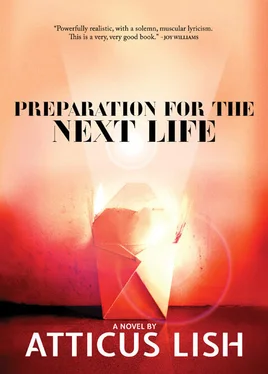They didn’t tell you?
No, I just sit in jail waiting, and I don’t know anything.
Now he was appalled. You got fucking stop-lossed! That’s the most fucked-up thing to do to someone…
She agreed. And she had a hard time with being closed-in. I think it make me lose my mind, so I am afraid of these police. Really that’s why I come to Queens, because so many foreign people is here, I think the cops can’t look for us.
What would happen if you got stopped by the cops? You’d go back?
I don’t know. Maybe something bad for me.
What’s the worst they could do?
I go to jail or deport back to China.
Can you do anything about it?
I don’t know. Maybe I can go to a lawyer, apply asylum. I think before 9/11 it’s easier than now.
Do they know you’re Muslim? Do the cops know?
No. I don’t think they know. Not too many people know what’s Uighur people. I just think no matter any kind of people, to stay in the U.S. it’s not easy right now.
So what’s that mean, you just gotta live not knowing what’s gonna happen to you?
I think so. She sighed. She raised her hands palm up and slapped them down on her thighs. Nothing I can do.
Skinner looked distraught. At her suggestion, they went outside in the lovely white-gold spring sunshine and wandered among the houses on 40 thRoad, where it seemed to both of them that it was an ordinary day and that their fears were exaggerated. But when they went back to his basement later and the golden light was cut by shadows, Skinner got very upset and wouldn’t speak. After she coaxed him repeatedly to tell her what was wrong, he said, I’ve got to stop fucking up. I can’t let you get deported.
He recalled a checkpoint on the road to Syria. Refugees from Baghdad were coming north in an attempt to flee the civil war. By political arrangement, Iraqi policemen controlled the checkpoint with American soldiers in a supporting role. In practice, this meant that the Iraqi police, who had been infiltrated by various mafias, could do whatever they wanted. Some GIs complained the policemen were levying exorbitant tolls on anyone not in the Zafir tribe. Others said they were turning Shiite Muslims back, mockingly telling them to go back to their villages where they would be killed by Sunni death squads.
Skinner witnessed an Iraqi policeman pull a girl over to the roadside and interrogate her, going through her bag, demanding to know why she was traveling alone. She was very young, maybe twelve years old. Her family had been killed in Baghdad. A GI told the man to give her a break. The Iraqi insisted that she wasn’t allowed to travel without a husband.
The Iraqi took her by the hand and led her away from the road where the land dipped down into a hidden wadi. Down in the maze of brown hills were a series of abandoned open-roofed buildings that were sometimes used as a latrine.
I saw she was scared.
We went to our First Sergeant, who ordered us to not do anything. We never saw the girl again. The next time I saw the Iraqi was two days later, and I asked him where she was. He asked me if I worried about dogs. She was a bad girl, a Ba’athist, an enemy of America, so he had found a husband for her.
The obvious solution was for Zou Lei and Skinner to work together, she said. They should combine forces and help each other with their respective problems.
She brought him around to talking constructively about the things that they should do. Above all, they should not dwell on sad things from the past. It would be the first of many similar talks that they would have in which they planned for the future. The bright side, she said, was that she had met him and they could form an army of their own, a two-person unit, to fight these difficult battles involving his mental recovery and her immigration status.
JIM. IF YOU’RE COMING, then come on.
It was five and the house was completely dark except downstairs where the kitchen light was on and Patrick, with small eyes and his hair combed back damp and flat, was wearing a plaid shirt and a diamond-stitched down vest and Dickies or something like Dickies — janitor’s pants — but without the brand name, all of his clothes faded and flattened, the puff taken out of the down, as if crushed out by the man who wore them. He was more impressive than his clothing. He spoke at a normal volume despite the hour. The effect was preemptory.
In his room, Jim knocked over his lamp looking for what he wanted to wear, cursed, and set the lamp upright and it fell again.
Mrs. Murphy appeared at the bottom of the stairs, her hair in curlers.
He’s coming. He’ll be right down. Do you men want coffee?
Patrick said something Irish.
Give him a minute.
Jimmy came down, not hurrying, no longer outweighed by his stepfather. There were four plaster buckets waiting in the kitchen to be carried out to the truck and a yellow four-foot level. The house creaked as the two large males carried everything outside. Mrs. Murphy went back to bed.
In the basement, Skinner heard the pickup cough to life and drive away.
There was no discussion between Mr. Murphy and Jimmy of what it was like to be freed after a long period of incarceration. They drove beneath the streetlights, which were still on, on 40 thRoad. Patrick remarked he didn’t want to hear jungle music. You didn’t pick it up in there, did you? No, said Jimmy, mildly. Then turn the radio on. The radio was tuned to a call-in program in which the host was defending American torture.
Ladies and gentlemen, that’s not torture. Stress positions, that’s not torture. That is nowhere near as bad as what these people have done for thousands of years. The beheading, stoning, burning, burying alive, flogging, flaying the skin, and so on. The cruelties inflicted on the members of their own religion. Maybe these liberals would feel differently if they had lost someone on September Eleventh: a beloved father, husband, wife, a son or daughter. Let’s open the phone lines. Hello, Ed, you’re on the air.
Hey, I just want to say I appreciate your show.
Thank you, my man.
My brother served in Operation Enduring Freedom, so he’s seen these lies we’re seeing now up close, how the media will take what they’re doing, which is, they might have built a school, and they don’t show that. They only want to know about the bad stuff. That’s what we’re seeing. And you get these people, for whatever reason, they want to believe the baby-killer hype. You give fresh water to Iraqi kids and you’re a baby killer.
Both the caller and the host laughed with exasperation.
I know, Ed. We’re at a time when it’s out-of-fashion to love this country apparently. And I want to extend my thanks to you and your brother. God bless him for his service. We are so grateful to our brave men and women in uniform. And the irony, Ed, is brave men and women like your brother go to this godforsaken country, they volunteered to go, while meanwhile people back here have the, the — they are complaining about them. When they don’t have to do it. They’re not the ones. The military goes and gets the job done and the armchair liberals complain. It’s just upside-down to me.
It is.
Thank you, Ed. We’ve got John in Maspeth.
They drove to a construction supply outlet on College Point Boulevard, next door to a Dunkin Donuts.
You’ve got time to get yourself something, Patrick said as he got out. His thirty-two-year-old stepson declined, stayed in the passenger seat. Jimmy was putting up with something. He was not happy, this was clear. But he would not complain. You would have to beg him to know how you had offended him. You would have to draw him out. Patrick would not do this. Patrick went into Dunkin Donuts and waited in line, bigger and taller than anyone else in line, than the young muscular Puerto Rican repairmen with tattooed forearms and a stud in the earlobe. He was the primary figure you would notice through the window. But Jimmy had banished him. Jimmy was derisively going through the contents of the glove box. Parking tickets, receipts, the registration bearing Patrick’s full, three-word Irish name. It was expired. Wasn’t it? He smirked. He checked the date. What was the date? He turned the key in the ignition and the radio came on. Like a technician, a craftsman, a musician, Jimmy concentrated on the radio dial, turning it, tuning it. The stations were different than they used to be. If there was no Deep Purple, then at least there should be Elvis. When Patrick came back, Frankie Valli was playing and Jimmy was fine-tuning the dial. He was distracted now. He did not look up. Patrick put their coffees on the dash, smalls. There was a deal for two donuts in a crinkling wax bag. Jimmy received what he was given. He would be tolerant through the entire exercise, the shabbiness of the truck, his stepfather’s unwillingness to put two dollars in his hand directly out of fear that it would be spent on something other than coffee. Now it was time to assert himself.
Читать дальше












